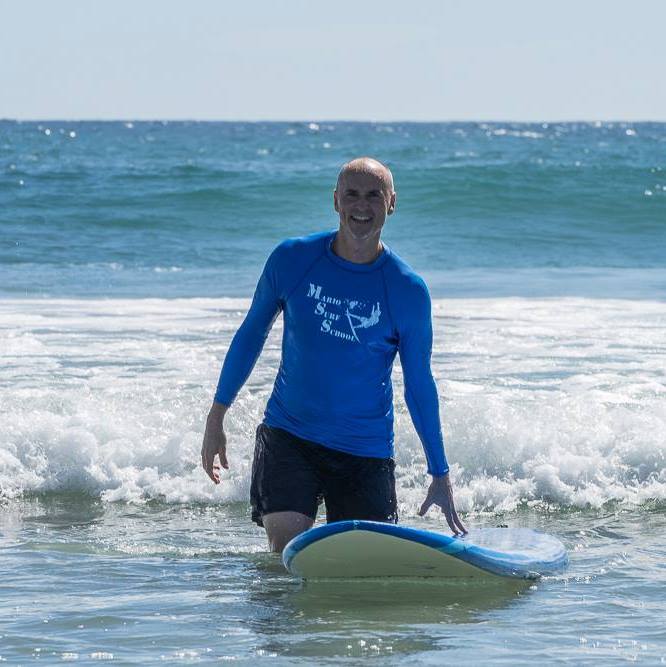Copilot Spotlight: Chip Conley

Chip catching some waves. Photo courtesy of Nina Dietzel.
The Co-Pilot Spotlight navigates into the minds and experiences of travel professionals and professional travelers. Join us in the cockpit with Chip Conley, Strategic Advisor to Airbnb.
OTPYM: Where was the first place you ever traveled?
CHIP CONLEY: In our old-school station wagon with wood paneling, my family took long drives in the American Southwest.
Where is the last place you visited?
I’m not sure I can say “visit,” but I live 50% of my time in southern Baja in Mexico so I’m traveling all around this desert meets tropical area.
Where is next for you? Why?
I’m heading to India for a Sufi Festival and connecting with good friends there in February.
Why do you choose to travel?
I’m relentlessly culturally curious so I love learning about other people and places and am a sucker for the transcendent view that gets etched in my memory. I also love the fact that traveling takes you into the moment and your heart as I spend a little too much time in my head on a normal day.
How has travel helped to define your world view?
When you’re culturally curious, you are open to “the other,” someone different than you who can teach you a few things. It makes you a wiser, more worldly person with more empathy genes in your soul.
Where is the favorite place you’ve traveled and why?
I’ve been to Bali 13 times, most recently with my 80-year-old father scuba diving. I had my 35th birthday party there with 25 friends long ago. I’m part owner of a restaurant in Ubud. I love the fact that art and spirituality are so woven in the culture and that the Balinese teach me about gratitude everyday.
When on your travels have you felt the most out of your comfort zone?
I experienced the largest gathering of humanity on the planet, the Kumba Mela festival at the Ganges River in India, in 2013 with 100 million people at this Hindu pilgrimage. I loved it but got caught up in a couple stampedes and was awestruck by the sheer volume of humanity.
Who is the most interesting person you have ever met while traveling and why?
I went to the annual whirling dervish festival in Konya, Turkey to celebrate the poet and philosopher Rumi and met a wise dervish who taught me the spiritual principles behind whirling and then he taught me how to whirl.
What is the most adventurous food you have tried while on the road?
Chapulines in Oaxaca (fried grasshoppers).
What’s the next trend in travel?
Experiencing life like a local through programs like Airbnb’s “Experiences” platform.
Any funny anecdotes from the road?
I loved the Roman host who opened his home to me realizing that I, at the time, was the Head of Global Hospitality and Strategy for Airbnb and he knew I was a long time boutique hotelier. He did his homework on me and realized I missed room service in the home sharing experience and appreciated Rumi the poet, who’s name comes from Rome. So, when I arrived at his home to stay there, he gave me menus from a few local restaurants that would deliver to the home as well as a book of Rumi poetry translated in Italian. He apologized and said, “I may not be able to provide you room service, but I can provide you Rumi service.”
We all have our stories. How has your life’s story influenced the way you travel?
I have a more expansive view of the world and appreciate “collective effervescence” that you see when people come together – either at a festival or viewing some beautiful vista – and their sense of ego separation melts and that sense of communal joy emerges. When you feel that connection to other humans in that moment, it’s as good as it gets.
What is the most impactful travel experience you have had? How has it shaped you?
There are so many places I’ve traveled – in Latin America, Asia, Africa – where people live on $1 per day and they’re perfectly content and loving there lives which helps me to realize that it’s experiences and human connection that light us up, not material possessions.
In what ways, as a society, can we change travel to be a force for good?
Cuba and Bhutan are two of my favorite places, partly because they have been so vigilant about being in a time bubble from long ago. Over-tourism can change places for the worse, so I think there’s a growing need for us to help support those places that don’t want to lose their soul. And, I help financially with organizations that help support cultural institutions in these places.
